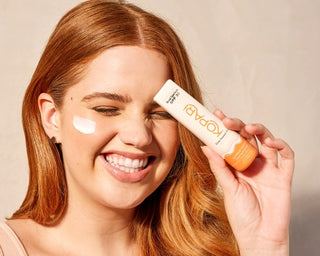Here’s the deal Kopari babes, we’ve determined how important it is to wear a great facial sunscreen every day & to protect our skin from long term sun damage! If you are good about adding a generous amount of protective sunscreen to your skin before you head out the door then you don’t have to miss out on some fun in the sun this Summer! With so many facial sunscreens on the market we wanted to share all you need to know about SPF and the key differences between mineral and chemical sunscreens.

To start, sun damage might not show up immediately but can appear later as wrinkles, sunspots, leathery skin, or even cancer. It’s important to use a great SPF product that is super easy to incorporate into your morning beauty ritual so it doesn’t feel like a dreadful extra step. Luckily for all of our #lazygirls out there, Kopari Mineral Face Sunscreen gets bonus points because it works not only as a protectant, but as an amazing primer to moisturize the skin before applying makeup!
So, what is the difference between chemical and mineral sunscreens? The difference is in how they work to protect your skin and what they protect from. Chemical sunscreens work by absorbing the UV rays into the skin, which then catalyzes a chemical reaction, transforming the UV rays into heat that is then released from the skin. This is why chemical sunscreens tend to be lighter as they are meant to soak into the skin and look more transparent. On the flip side, mineral sunscreens create an actual physical protective layer on top of the skin to deflect UV rays from hitting and damaging the skin. Instead of absorbing into the skin, mineral sunscreens deflect the rays before they can cause any damage.
Most chemical sunscreens only block UVB rays that damage superficial layers of the skin, but do not protect against UVA rays that cause deeper damage to the skin, like wrinkles and sunspots. Mineral sunscreens are topical and effective on application. No wait time necessary! Even better, they block both UVA and UVB rays, so your face is safe from all kinds of damage.
Chemical sunscreens can also contain harmful chemicals such as oxybenzone and octinoxate that are known to cause allergies, hormonal- imbalances, and even kill coral. Hawaii recently passed a bill to prohibit the sale of sunscreens containing oxybenzone and/or octinoxate after reviewing evidence that these active ingredients affect coral reefs and marine life. Chemical sunscreens can also aggravate acne and can be harsh on sensitive skin. Need more reasons to ditch oxybenzone? The American Academy of Dermatology voted it the number one skin irritant. Enough said. So what’s the alternative? Well, mineral sunscreens contain zinc oxide and titanium dioxide which are much gentler on the skin and actually have a longer shelf life than chemical sunscreens. Get all the good stuff and ditch the chemical irritants!

At Kopari, we are committed to making healthy choices for your skin more convenient and accessible. That’s why we created our Sundaze Mineral Face Sunscreen to protect your face from harmful rays and chemicals while also protecting our oceans and the marine life that live in them! Shop the post below ☀️



